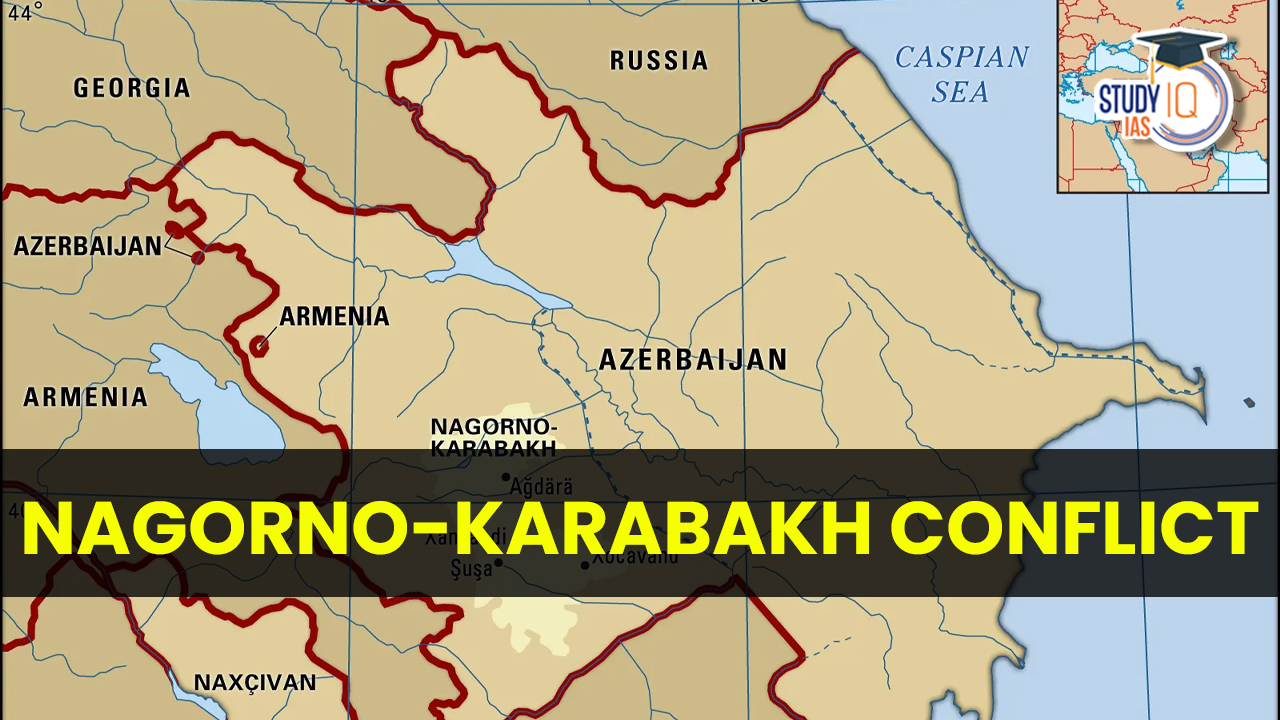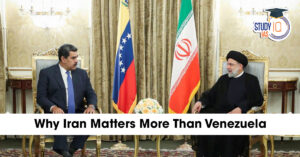Table of Contents
Context: The recent escalation in the territorial disagreement between Armenia and Azerbaijan over the Nagorno Karabakh region has resulted in significant clashes.
More on the News:
- The conflict between Armenia and Azerbaijan over Nagorno-Karabakh is called one of the “frozen conflicts” of the world.
- This conflict erupted on September 19, when Azerbaijan launched an offensive and within 24 hours, declared victory over the separatist province of Nagorno-Karabakh.

About the Nagorno Karabakh Region:
- Nagorno-Karabakh is a mountainous and a heavily forested region lying south of Caucasus mountains.
- The region includes the north-eastern flank of the Karabakh Range of the Lesser Caucasus and extends from the crest line of the range to the margin of the Kura River lowland at its foot.
- It is officially recognised as part of Azerbaijan.
- However, its 1.2 lakh population is predominantly ethnic Armenian, having close cultural, social, and historical ties with Armenia.
- The Armenians are Christians, while Azeris are Muslims.
- Basically, Nagorno-Karabakh is an ethnic Armenian enclave in Azerbaijan. The conclave is connected to Armenia through the 5-km Lachin Corridor.
What is the Conflict?
- In the early 1920s, after the Bolshevik revolution in Russia, the new Soviet rulers, established the Nagorno-Karabakh Autonomous Region, with an ethnic Armenian majority.
- This region was established within the Soviet Socialist Republic of Azerbaijan.
- As Soviet control loosened towards the end of the 1980s, there was Armenian-Azeri frictions that exploded into violence when the regional legislature of Nagorno-Karabakh, passed a resolution declaring its intention to join Armenia.
- With the break-up of the Soviet Union, in late 1991, Karabakh declared itself an independent republic, further escalating the conflict into a full-scale war.
- The war lasted from 1991 to 1994 resulting in the deaths of about 30,000 people and the displacement of over a million people.
- In 1994, Russia brokered a ceasefire known as the Bishkek Protocol, which established a de facto independent Nagorno-Karabakh with a self-proclaimed government in Stepanakert.
- However, the region remained heavily reliant on close economic, political, and military ties with Armenia.
- In 2020, Azerbaijan and Armenia went to war again over the region and as a result, Azerbaijan managed to wrest control of the territory around Nagorno-Karabakh.
- In 2022, Azerbaijan blockaded the Lachin Corridor, the only road connecting Nagorno-Karabakh to Armenia, causing severe shortages of essential goods including food, fuel, and water in Nagorno-Karabakh.
- In 2023, days after an agreement to reopen the Lachin Corridor for aid deliveries sparked hopes of easing the crisis, Azerbaijan launched an “anti-terrorist” offensive in Nagorno-Karabakh and claimed to have regained full control over the region.
India’s Stand:
- No Specific Policy
- India has no specific public policy for the South Caucasus region like the ‘Neighborhood First Policy’ or ‘Act East’.
- India believes that any lasting resolution of the conflict can only be achieved peacefully through diplomatic negotiations.
- Relationship with Armenia
- India and Armenia signed a Treaty on Friendship and Cooperation in Dec. 1995.
- If the conflict in the Nagorno-Karabakh region reaches the territory of Armenia, this treaty will prohibit India from providing military or any other aid to Azerbaijan.
- Armenia has openly supported India on the Kashmir issue, while Azerbaijan has the support of Pakistan.
- Relationship with Azerbaijan
- India is part of the International North–South Transport Corridor (INSTC), a multimodal network of ship, rail, and road route for moving freight between India, Iran, Afghanistan, Azerbaijan, Russia, Central Asia and Europe.
- Investments have been made in oil field projects by ONGC Videsh Limited in Azerbaijan and GAIL is exploring the possibilities of cooperation in the field of LNG.
- Azerbaijan is a dialogue partner of Shanghai Cooperation Organisation (SCO), which India is a member of.
- However, in the Kashmir issue, Azerbaijan has garnered its support to Pakistan.
Global Perspective:
- Pakistan:
- India has been supported Armenia while Azerbaijan has been supported by Pakistan.
- Pakistan was the second country to recognize Azerbaijan’s independence after Turkey.
- Also, Pakistan is the only country that does not recognize Armenia as an independent state and fully supports Azerbaijan’s position.
- China Angle:
- China has grown increasingly active in the caucasian region, conducting a number of programs and signing economic, political and military agreements with Armenia.
- Armenia has also agreed to participate in the Chinese Belt and Road project.
- However, China is an ally of its rival Azerbaijan.
- Turkey: Due to the involvement of regional rivals Turkey and Russia, this conflict has attracted worldwide attention.
- Muslim-majority Turkey is a NATO ally and backs Azerbaijan.
- Turkey’s support for Azerbaijan may be seen as an attempt to counter Russia’s influence in the region of South Caucasus.
- In 1991, Turkey was the first country to recognize the independence of Azerbaijan.
- On the other hand, Armenia is a member of Russian led Collective Security Treaty Organization- CSTO.
- For all other countries, the region is an important transit route for the supply of oil and natural gas to the European Union.


 Union Home Minister Calls for Hi-Tech So...
Union Home Minister Calls for Hi-Tech So...
 Supreme Court to Examine Scope of 'Right...
Supreme Court to Examine Scope of 'Right...
 Why Iran Matters More Than Venezuela: En...
Why Iran Matters More Than Venezuela: En...

























